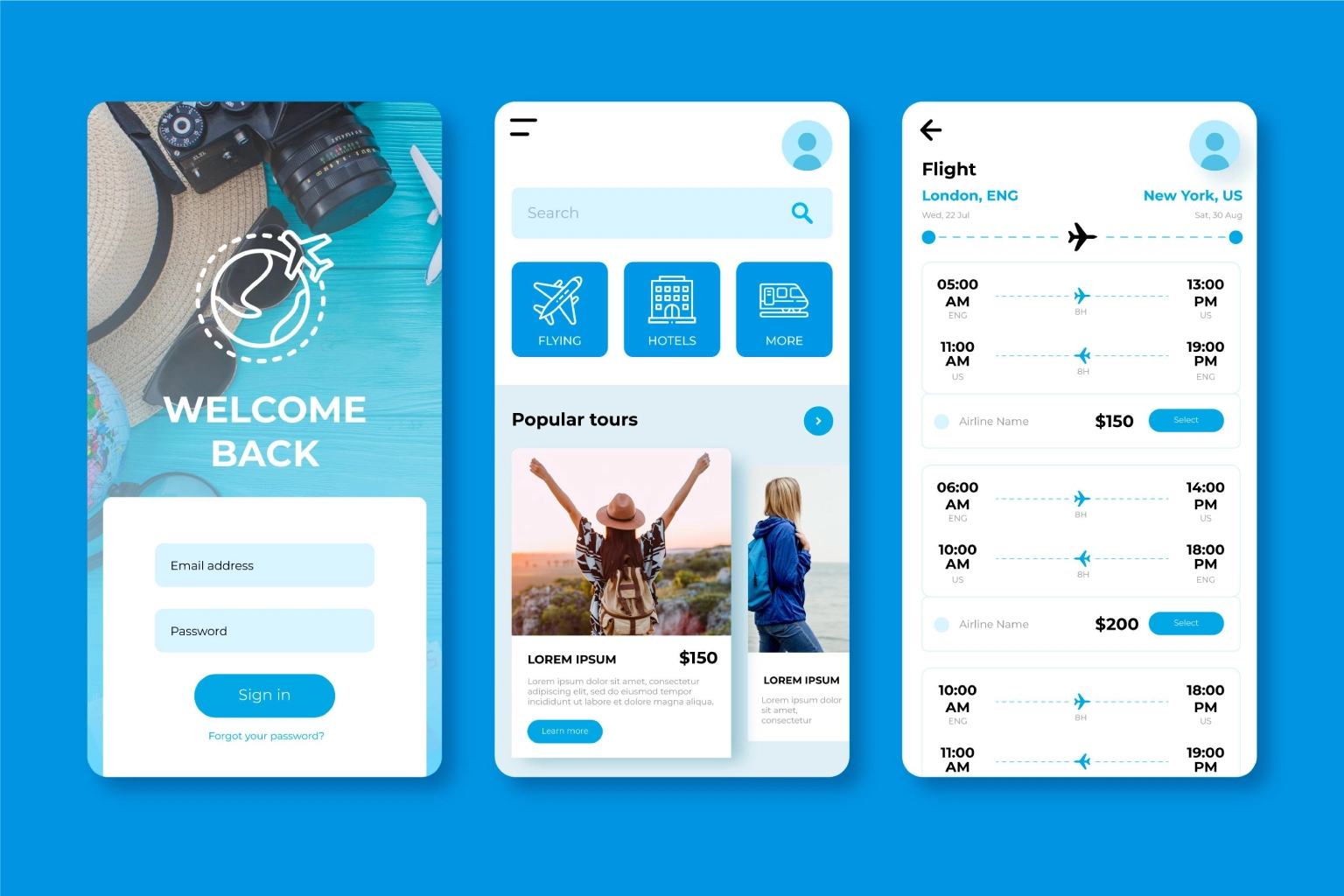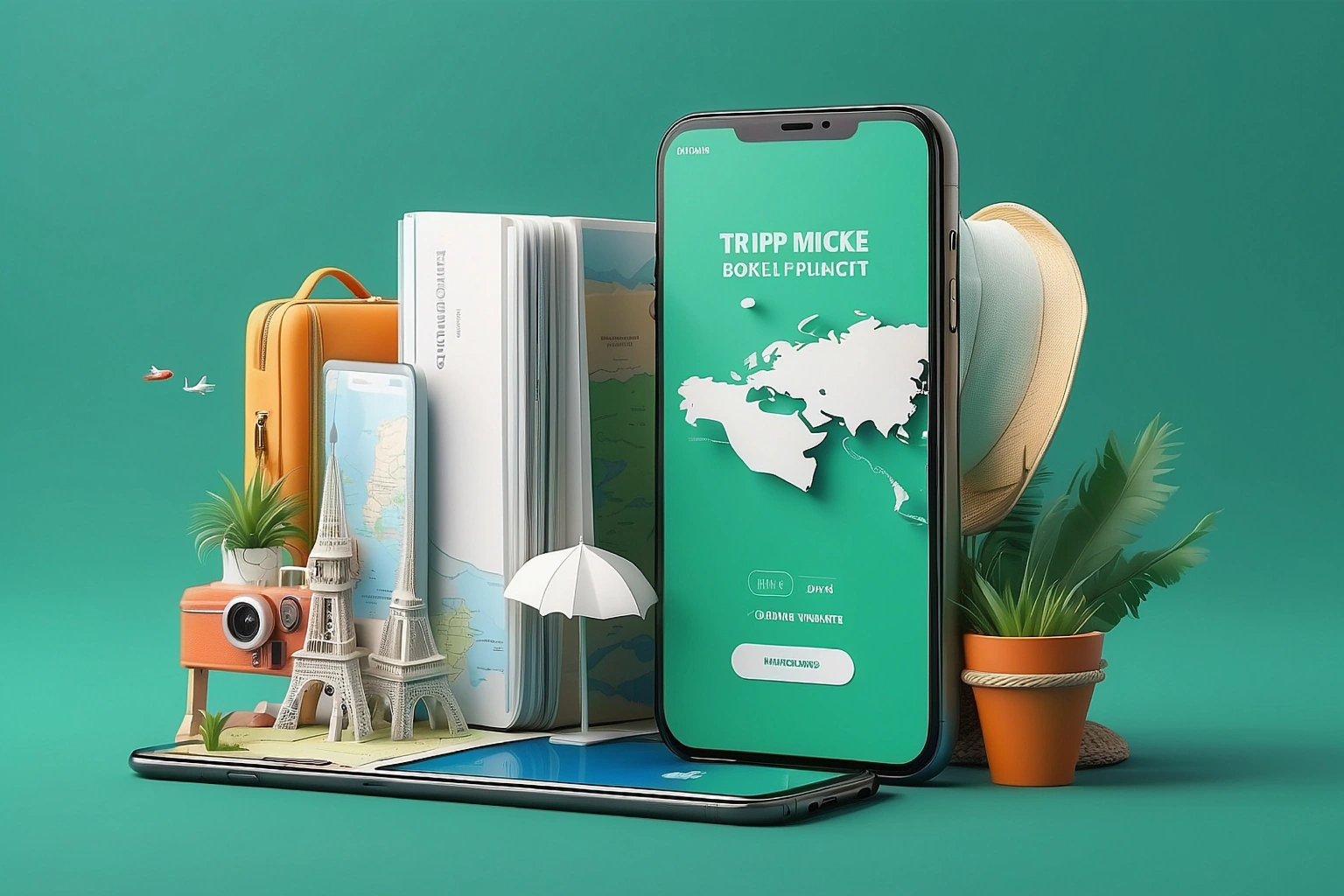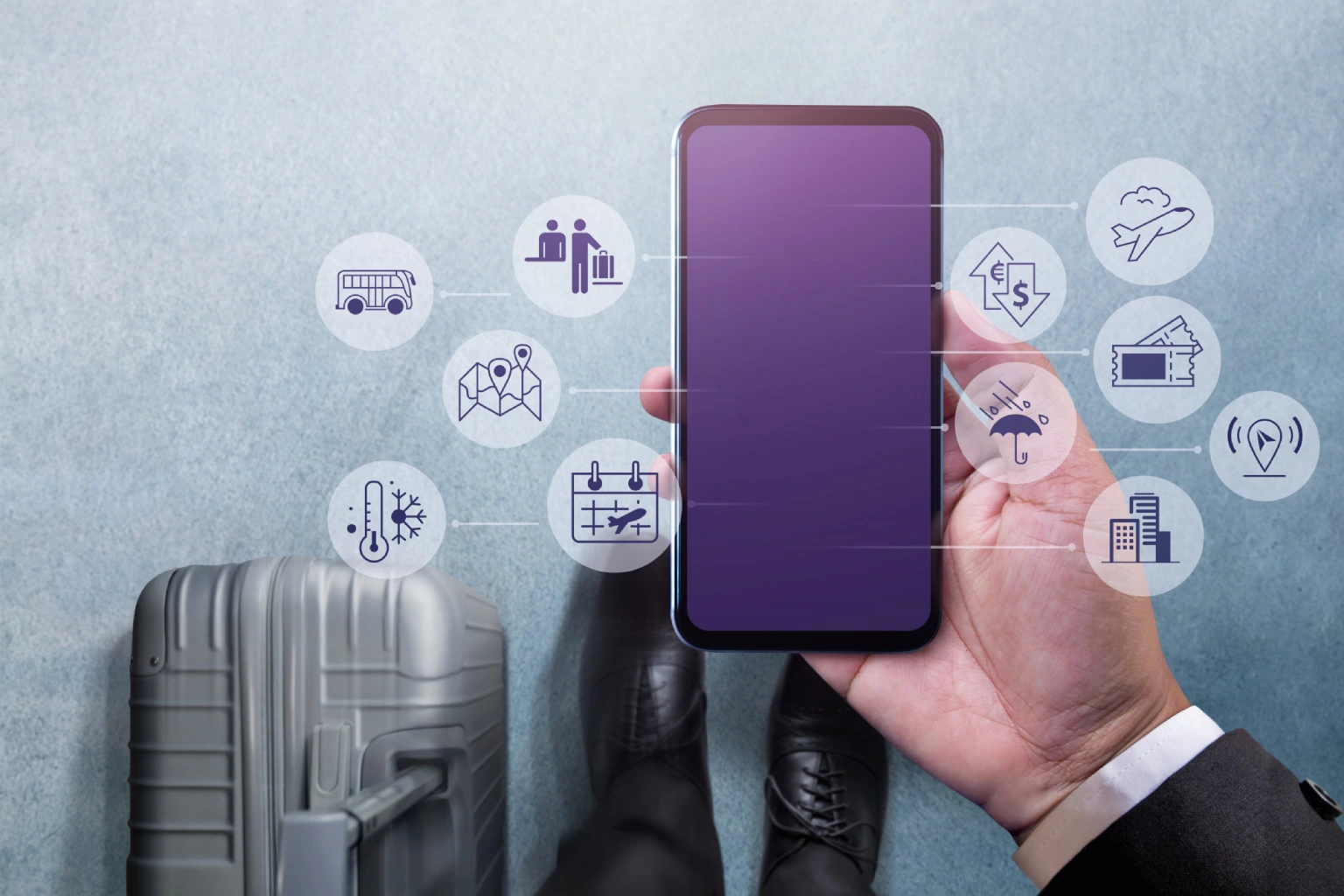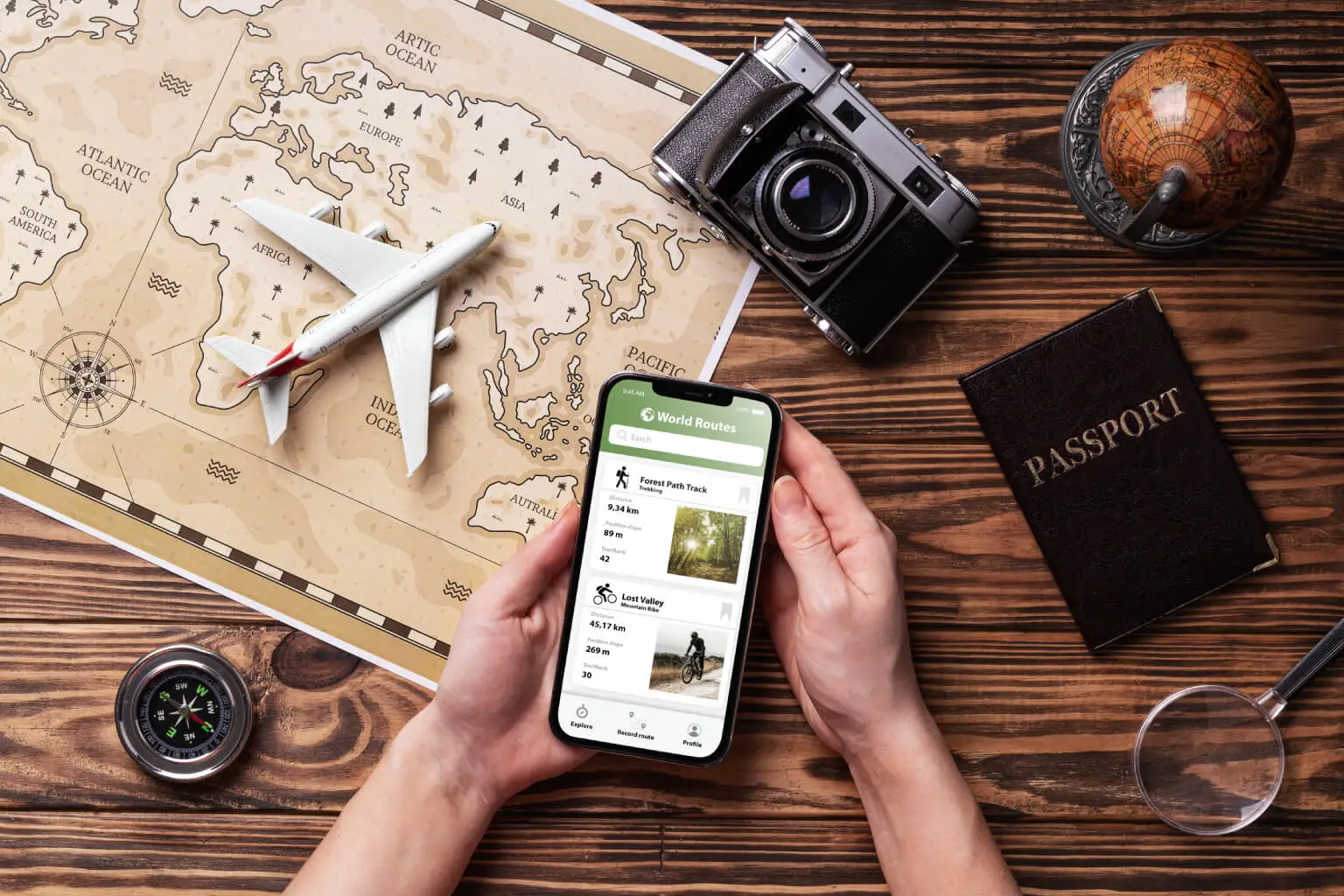Table of Contents
ToggleWhen people travel, they want their journey smooth, with hassle-free planning and advanced bookings to increase their experience. In today’s mobile-driven world, frequent travelers and occasional tourists alike prefer to book hotels, and cabs, and explore destinations with just a single tap. Mobile applications have transformed the travel experience, making it more convenient and AI-personalized.
Many travel mobile apps in the market provide essential travel guides, while AI-powered recommendation apps like Culture Trip have gained immense popularity by offering custom travel experiences, curated content, and easy booking options.
Before launching a travel startup or upgrading an existing travel business, proper planning and budgeting are important. Suppose you are considering developing a travel mobile app and thinking about the travel app development cost. In that case, it is essential to understand that the cost depends on multiple factors, including mobile app complexity, key features, technology stack, and mobile app development team rates.
In this blog, we will break down the travel app features and cost, the mobile app development timeline, and the factors that influence travel app development pricing to help you estimate the budget for your project.
Let’s begin the journey to explore everything you need to know about travel app features and costs!
Types of travel mobile applications
Understanding the types of travel mobile applications is important before building a travel recommendation app.
There are different types of travel apps, each with varying mobile app development pricing:
| Type of Travel App | Examples | stimated Cost ($) |
|---|---|---|
| Travel Guide & Recommendation Apps | Culture Trip, TripAdvisor | $25,000 – $60,000 |
| Travel Booking Apps | Expedia, Booking.com | $40,000 – $100,000 |
| Navigation & Itinerary Planning Apps | Google Trips, Roadtrippers | $30,000 – $80,000 |
| Social Travel Apps | Travello, Couchsurfing | $50,000 – $120,000 |
| Custom Travel Apps | Custom-made solutions for businesses | Varies based on features |
Factors affecting travel app development cost
There are several factors that determine the cost to build a travel app like Culture Trip. It is important to understand these factors will help you plan your budget effectively and ensure that your mobile app meets both business and user expectations.
1. App complexity and features
The complexity of your travel mobile app significantly affects the overall mobile app development cost. Basic travel guide mobile apps with simple search and recommendation features are more affordable, while advanced AI-powered travel mobile apps require complex machine learning algorithms, increasing development costs. If you are adding features like real-time navigation, personalized AI recommendations, AR/VR experiences, and chatbot integration further add to the expenses.
2. Platform choice (iOS, Android, or Both)
Platform choice is an important factor in travel app development pricing. If you are selecting both iOS and Android, it will cost more than building for a single platform due to the need for additional mobile app development and testing efforts.
Cross-platform technologies like Flutter or React Native can reduce costs while ensuring a smooth user experience across devices. The decision should be based on your target audience, budget, and long-term business goals.
3. UI/UX for travel apps
A visually appealing and user-friendly design is important for user engagement and retention. The travel app UI/UX design cost depends on the level of customization, animations, interactive elements, and smooth navigation flow.
High-end UI/UX mobile app designs with unique branding and dynamic elements increase user experience but require additional design efforts, increasing development time and cost.

4. Tech stack for travel apps
The choice of technology stack directly impacts mobile app performance, scalability, and mobile app development cost. A well-optimized tech stack ensures a fast, secure, and scalable app that can handle a growing number of users and transactions.
Commonly used tech stacks for travel apps include:
- Frontend: React Native, Flutter, Swift(iOS), Kotlin (Android)
- Backend: Node.js, Ruby on Rails, Firebase, Python
- Database: PostgreSQL, MongoDB, MySQL
- Third-party Integrations: Google Maps API (location services), Stripe/PayPal (payment processing), Firebase (real-time database), Twilio (SMS notifications)
Choosing the right tech stack affects app speed, functionality, and future scalability, making it a critical decision during mobile app development.
(Also read: Top 3 Backend Frameworks for Web and App Development)
5. Integration with third-party services
Many travel mobile apps depend on third-party services to increase functionality. If your mobile app requires integration with hotel booking systems, flight aggregators, payment gateways, real-time navigation tools, or AI-powered recommendation engines, these will add to the travel app development pricing. Each integration requires additional mobile app development and testing, leading to higher costs.
6. Cost of hiring app developers
The cost of hiring app developers changes based on mobile app developers‘ experience level, geographic location, and project complexity. It is important to remember that developers in different regions charge different hourly rates, and hiring from the best travel app development companies ensures high-quality output.
Below is the breakdown of estimated hourly rates for mobile app developers:
| Region | Hourly Rate |
|---|---|
| USA/Canada | $80 – $150 per hour |
| Europe | $50 – $100 per hour |
| India | $20 – $50 per hour (cost-effective without compromising quality) |
Hiring developers from India or other cost-effective regions can significantly reduce travel app development costs while maintaining high-quality standards. It is essential to choose a skilled and experienced team to ensure a smooth development process.
Travel app development cost breakdown
| App Type | Estimated Development Cost | Development Time |
|---|---|---|
| Basic Travel Guide App | $10,000 – $30,000 | 2–4 months |
| Mid-Level Travel Booking App | $30,000 – $70,000 | 4–8 months |
| Advanced AI-Powered Travel App | $70,000 – $150,000+ | 8–12 months |
The cost to develop a travel app varies based on design complexity, backend infrastructure, and integrations.
Travel app monetization strategies
To make your travel mobile app financially sustainable, it is essential to implement effective travel app revenue models. A well-planned monetization strategy ensures a steady income stream while increasing user experience.
Here are some of the best ways to monetize a travel app:
1. Subscription model
A subscription-based model allows users to access premium features for a monthly or yearly fee. You can include features like personalized AI travel recommendations, offline maps, exclusive travel deals, and ad-free experiences. This travel app revenue model ensures consistent revenue while providing loyal users with added benefits.
Travel mobile apps like TripIt Pro and Culture Trip app development successfully use this approach to increase user experience.
2. In-App advertising
You can generate revenue in your travel mobile apps by displaying banner ads, video ads, or sponsored content from travel brands and partners.
Google AdMob and Facebook Audience Network are popular ad platforms for monetization. However, excessive ads can negatively impact user experience, so it is essential to maintain a balance between ads and usability.
3. Affiliate marketing
Affiliate marketing is one of the most profitable travel app monetization strategies. Your mobile app can earn commissions by promoting services such as hotel bookings, flight tickets, car rentals, or local experiences.
You can integrate with affiliate programs from Expedia, Booking.com, Skyscanner, and TripAdvisor can generate passive income while providing value to users.
4. In-App purchases
Travel mobile apps can offer premium content, offline travel guides, language translation packs, virtual tour access, or itinerary planning services as in-app purchases. Users can buy these additional features to increase their travel experience, making it a great way to increase revenue while keeping the core mobile app free.
5. Sponsored listings and partnerships
Partnering with hotels, restaurants, and travel agencies to feature their services as sponsored listings within the travel mobile app can be another lucrative revenue model. Businesses pay a fee to be featured, gaining exposure while helping users discover exclusive travel deals.
6. Freemium model
The freemium model allows users to access basic features for free, while premium features require an upgrade. This strategy encourages user engagement and increases conversion rates, as travelers who find value in the mobile app are more likely to pay for premium services.
7. Commission-based booking system
If your travel mobile app includes a hotel, flight, or tour booking feature, you can earn revenue by charging a commission on every booking made through the mobile app. Many online travel agencies (OTAs) like Expedia and Airbnb follow this model, making it a proven revenue strategy.

Travel app development timeline and must-have features
Development timeline
| Development Phase | Duration |
|---|---|
| Market Research & Planning | 2-4 weeks |
| UI/UX Design | 4-6 weeks |
| Backend & Frontend Development | 3-6 months |
| Testing & Bug Fixing | 2-4 weeks |
| Deployment & Launch | 1-2 weeks |
(Also Read: Tips to Choose a Perfect Developer for Your Business Website and App)
Must-have Travel guide app features
1. User registration & profiles: Users should be able to sign up, create profiles, and save preferences for personalized recommendations. You can include social media login options and profile customization to increase user experience.
2. Search & filtering options: Advanced search capabilities help users find destinations, accommodations, and attractions based on criteria like budget, ratings, and travel type.
3. Location-based recommendations: GPS-based suggestions provide real-time, relevant travel recommendations based on the user’s current location, ensuring a personalized experience.
4. Booking & reservation system: Users should be able to book flights, hotels, and activities with real-time availability and instant confirmations for a hassle-free experience.
5. Payment integration: Secure payment gateways like PayPal, Stripe, and Google Pay support multiple payment methods, ensuring smooth and secure transactions.
6. User reviews & ratings: Allow users to rate destinations, leave reviews, and upload photos/videos to help other travelers make informed decisions.
7. Offline mode: Users can access maps, travel guides, and itineraries without an internet connection, making it ideal for international travel.
8. AI-powered personalized recommendations: AI suggests destinations, hotels, and activities based on user behavior, preferences, and previous searches, improving recommendations over time.
9. Augmented reality (AR) experiences: AR enables users to explore virtual landmarks, preview hotel rooms, and navigate cities with interactive real-world overlays.
(Also Read: Top 6 Ways How Augmented Reality (AR) Can Boost Customer Engagement in Retailing)

What are the travel app development hourly rates
Hiring the right mobile app development team is important for building a high-quality travel app. The travel app development hourly rates depending on the team’s location:
| Region | Hourly Rate ($/hour) |
|---|---|
| USA & Canada | $100 – $200 |
| Western Europe | $80 – $150 |
| Eastern Europe | $40 – $80 |
| India & Southeast Asia | $20 – $50 |
Travel app maintenance and updates cost
After launching your travel mobile app, regular maintenance is essential to ensure smooth performance.
Below are table breakdown that provides you with travel app maintenance and updates costs:
| Maintenance Task | Estimated Cost (Per Year) |
|---|---|
| Bug Fixes & Security Updates | $5,000 – $15,000 |
| New Features & Enhancements | $10,000 – $30,000 |
| Server & Hosting Costs | $1,000 – $5,000 |
| Marketing & User Acquisition | Varies based on strategy |
How Alphaklick can help you build a travel app like Culture Trip
Building a successful travel mobile app requires expertise in UI/UX design, backend development, and third-party integrations to ensure a smooth user experience. Alphaklick specializes in custom travel app development, offering custom solutions that align with your business goals.
We focus on cost-effective development without compromising quality, ensuring that your mobile app meets industry standards while staying within budget.
Our mobile app developers are skilled in the latest travel app technologies, including AI-powered recommendations, AR experiences, and real-time location-based services. Alphaklick provides end-to-end support to help you launch a robust travel app that keeps users engaged.
Conclusion
The cost to develop a travel app depends on various factors, including features, platform choice, and development team location. A basic travel booking app development cost
around $20,000 – $40,000, while an advanced app with AI and AR features can go beyond $100,000.
By carefully selecting the right monetization strategy and mobile app development team, you can build a successful travel guide app like Culture Trip and generate sustainable revenue.





















